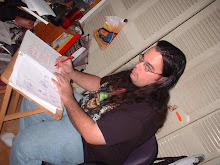 After basically being kicked out of Europe for his controversial movies, Luis Bunuel went to Mexico to make feature films. If you put yourself in a historical perspective, this was a little insane, considering the Mexican movie scene. You see, in the thirties and fourties, Mexico made some well-made but historically dubious films. The kind where they were full of romance, adventure, and the heroes and villains were black and white. Basically, they were trying to make an image of Hollywood. But Bunuel was far ahead of this, and decided that he would make a movie representing the reality of the streets in Mexico. What he made was Los Olvidados.
After basically being kicked out of Europe for his controversial movies, Luis Bunuel went to Mexico to make feature films. If you put yourself in a historical perspective, this was a little insane, considering the Mexican movie scene. You see, in the thirties and fourties, Mexico made some well-made but historically dubious films. The kind where they were full of romance, adventure, and the heroes and villains were black and white. Basically, they were trying to make an image of Hollywood. But Bunuel was far ahead of this, and decided that he would make a movie representing the reality of the streets in Mexico. What he made was Los Olvidados. The plot features the misfortunes that befall a group of young children in Mexico City, particularly those of Pedro (Alfonso Mejia) and El Jaibo (Roberto Cobo). El Jaibo has just come out of jail, and decides the first thing he’s going to do is beat the kid who squealed on him, Julian (Javier Amezcua). El Jaibo finds him and beats him up, but sadly beats him up at the same time. This is all witnessed by Pedro, which of course puts him in a very awkward position. But Pedro’s mother (Estela Inda) is sick of him and sends him to juvenile hall. Here, he reforms, and during a fight with El Jaibo, he tells about the fact that Jaibo killed Julian. El Jaibo escapes, but he’s made himself sure that he will come back, and as you can imagine, this movie does not have a happy ending.
The plot features the misfortunes that befall a group of young children in Mexico City, particularly those of Pedro (Alfonso Mejia) and El Jaibo (Roberto Cobo). El Jaibo has just come out of jail, and decides the first thing he’s going to do is beat the kid who squealed on him, Julian (Javier Amezcua). El Jaibo finds him and beats him up, but sadly beats him up at the same time. This is all witnessed by Pedro, which of course puts him in a very awkward position. But Pedro’s mother (Estela Inda) is sick of him and sends him to juvenile hall. Here, he reforms, and during a fight with El Jaibo, he tells about the fact that Jaibo killed Julian. El Jaibo escapes, but he’s made himself sure that he will come back, and as you can imagine, this movie does not have a happy ending.With a plot like that, you can imagine how Mexico got all panicky about this film. How could they make a movie where they featured the sad, unpleasant realities of life instead of a fantasy world? What I find surprising is the fact that it’s so damn realistic. You gotta remember, Bunuel’s films are mostly very anti-Catholic, very surrealistic and very weird. However, this one is done with the realism that one at the time could associate with the Italian Neo-Realism genre. And like most realistic films (ala the previously-realistic Pixote), the film was shot in real locations which look more like a mix between dirty streets and shitty dumpsters, and real people in the roles. Even with the non-actors, they feature some pretty good performances. Both Alfonso Mejia and Roberto Cobo are very good in their roles, very naturalistic, which probably makes sense considering they’re non-actors. My favorite performance however was that of the Blind street musician, played by Miguel Inclan. He’s both sympathetic but highly umpleasant.
 I have the same warning that I gave in my review for Pixote: this film is grim, dark and not very happy. It features the reality of human suffering from a children’s perspective. So if you’re willing to give yourself the chance to view it, you’ll find one of the greatest films ever made.
I have the same warning that I gave in my review for Pixote: this film is grim, dark and not very happy. It features the reality of human suffering from a children’s perspective. So if you’re willing to give yourself the chance to view it, you’ll find one of the greatest films ever made.


No hay comentarios:
Publicar un comentario